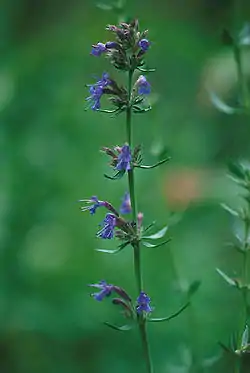hyssop
English
Etymology
Via Latin hȳsōpum, from Ancient Greek ὕσσωπος (hússōpos), of Semitic origin.
Pronunciation
IPA(key): /ˈhɪ.səp/
Audio (Southern England) (file)
Noun
hyssop (countable and uncountable, plural hyssops)
- Any of several aromatic bushy herbs, of the genus Hyssopus, native to Southern Europe and once used medicinally.
- 1940, Rosetta E. Clarkson, Green Enchantments: The Magic Spell of Gardens, The Macmillan Company, page 253:
- The life of one plant would be affected by another. Rue was definitely hostile to basil, rosemary to hyssop, but coriander, dill and chervil lived on the friendliest of terms[.]
- Any of several similar plants:
- (obsolete, US) The sagebrush (Artemisia spp.).
- (biblical) A plant used used for sprinkling of blood or water in purification rituals and at Passover, Origanum syriacum.
Derived terms
Translations
herb of the genus Hyssopus
|
Agastache foeniculum
|
sagebrush — see sagebrush
- The translations below need to be checked and inserted above into the appropriate translation tables. See instructions at Wiktionary:Entry layout § Translations.
References
 Hyssopus officinalis on Wikipedia.Wikipedia
Hyssopus officinalis on Wikipedia.Wikipedia  Hyssopus (plant) on Wikipedia.Wikipedia
Hyssopus (plant) on Wikipedia.Wikipedia  Hyssopus (Lamiaceae) on Wikispecies.Wikispecies
Hyssopus (Lamiaceae) on Wikispecies.Wikispecies
This article is issued from Wiktionary. The text is licensed under Creative Commons - Attribution - Sharealike. Additional terms may apply for the media files.
